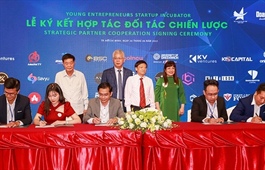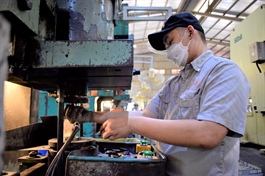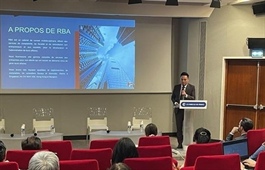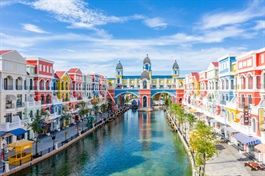EU supporting comprehensive implementation of the EVFTA
EU supporting comprehensive implementation of the EVFTA
Implementation of the EU - Vietnam Free Trade Agreement is contributing to promoting trade and investment activities among business communities and people of both sides. Peter Bernhardt, team leader of the ARISE+ Vietnam project, talked with VIR’s Thanh Dat about the impact on Vietnam so far and addressed how the EU can support the country in implementing the deal more effectively.
Since coming into force in August 2021, the EU - Vietnam Free Trade Agreement (EVFTA) has become an effective tool for boosting trade ties between the EU and Vietnam. What should Vietnam pay attention to in order to benefit more from this deal?
I agree that the overall picture of EVFTA performance in this starting period, where exporters and government authorities from both sides have to adapt to the new situation, looks definitely promising. The EVFTA is the most ambitious FTA that the EU has ever signed with a developing country. The deal will mutually lift about 99 per cent of the tariffs within 10 years. Duty was lifted from 65 per cent of EU exports to Vietnam and 71 per cent of Vietnamese exports to the EU, immediately after the EVFTA came into effect.
As most Vietnamese exporting products are consumer products, the real challenge Vietnam exporters will face to comply with EU consumer protection regulations is to assure that they produce a safe and sustainable product. Testing for consumer goods such as textiles, footwear, toys, food-contact products, packaging, furniture, and electrical and electronic products is becoming crucial.
By understanding that EU customers are more and more inclined to use products which comply with safety standards and are manufactured in a responsible manner, Vietnamese businesses will gain a competitive advantage over their competitors as they will be able to demonstrate their commitment to product safety, high product quality as well as environmental and social sustainability.
The EVFTA will create numerous opportunities for businesses of both Vietnam and the EU to boost trade
How important is it for Vietnam to fully implement the agreement, and what needs to be done by both sides to make this process work effectively?
Dropping tariffs is one good thing, but non-tariff measures still remain and should be prioritised, such as the simplification of the Vietnamese customs clearance process, which will improve trade and shipping facilitation.
EU-specific regulations for imported products must be well-known to Vietnamese manufacturing companies as all EU sectors are highly regulated and products must conform to a number of regulations in health, safety, and environmental protection.
Each Vietnamese agricultural or processed food product is subject to special entry conditions in the EU market to check for contamination risks, as some substances are banned in the EU. Vietnamese farmers and exporters must be aware, and the government has to set up sufficient control capacities and capacity-building efforts to inform about safety for human consumption according to EU standards, to avoid rejection of products at the EU border.
Could you elaborate on the support that the EU can offer to Vietnam in carrying out the EVFTA in a more effective manner?
The Vietnam Trade-related Assistance Programme (ARISE+) is a programme funded by the European Union supporting the Vietnamese government to reap the benefits of new bilateral and regional trade commitments, with a focus on the implementation of the EVFTA.
Regarding the current challenges, the EU has flanked the implementation process with a large project of €6 million ($6.35 million) to support Vietnamese ministries to set all necessary action to support the private sector to be familiar with the agreement.
In tight partnership with ministries and the EU Delegation to Vietnam, I have undertaken a needs assessment and we are now focusing on supporting a qualified team of more than 30 local and international short-term experts. The project is designed to assist the Vietnamese government in different focuses, such as understanding and conforming to EU sanitary and phytosanitary regulations as well as technical barriers to trade; setting up a rapid response facility to deal with technical issues such as rules of origin; establishing a dialogue advisory group; and supporting impact analysis and tariff transpositions.
The Arise+ Vietnam programme is an EU flagship of trade-related assistance to the Vietnamese government and I am proud to be a part of it.























